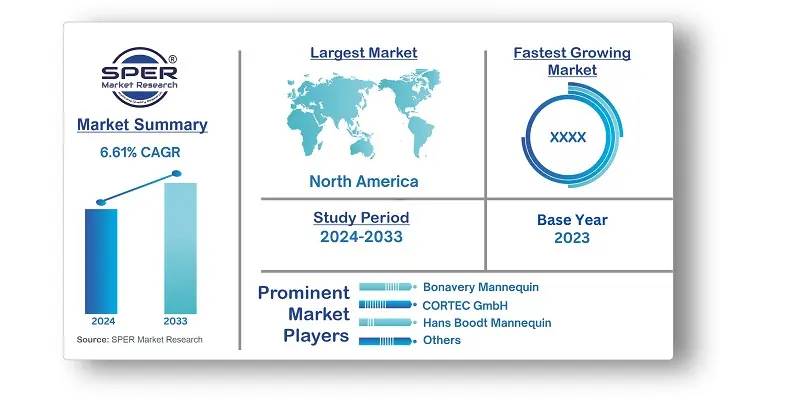
Mannequin Market Growth, Size, Trends, Demand, Share, Revenue, Challenges and Future Outlook
Mannequin Market Size- By Product Type, By Material Type, By Target Group- Regional Outlook, Competitive Strategies and Segment Forecast to 2033
| Published: Mar-2024 | Report ID: FMCG2474 | Pages: 1 - 215 | Formats*: |
| Category : Consumer & Retail | |||
- 2023: MuckN Brass began supplying department stores in the United Kingdom with "Luxe-Cycling," mannequin legs intended for use in gardening projects.
- 2022: In London, United Kingdom, Sempere Mannequin began offering custom-made sports and athlete torsos along with other mannequin accessories.


| Report Metric | Details |
| Market size available for years | 2020-2033 |
| Base year considered | 2023 |
| Forecast period | 2024-2033 |
| Segments covered | By Product Type, By Material Type, By Target Group |
| Regions covered | North America, Asia-Pacific, Latin America, Middle East & Africa and Europe |
| Companies Covered | Bonavery Mannequin, Cofrad Mannequin, CORTEC GmbH, Genesis Display GmbH, Hans Boodt Mannequin, Noa Brands Europe SL, Proportion London Ltd., Wuxi Elegant Mannequin Co. Ltd. And Window France. |
- Fashion Designers and Brands
- Visual Artists and Photographers
- Mannequin Manufacturers and Suppliers
- Fashion Schools and Training Institutes
- Interior Designers
| By Product Type: |
|
| By Material Type: |
|
| By Target Group: |
|
- Global Mannequin Market Size (FY’2024-FY’2033)
- Overview of Global Mannequin Market
- Segmentation of Global Mannequin Market By Product Type (Full Body, Head, Lower Body Mannequin, Upper Body).
- Segmentation of Global Mannequin Market By Material Type (Chrome, Fibreglass, Polyethylene, Polypropylene).
- Segmentation of Global Mannequin Market By Target Group (Adults, Children and Infants.).
- Statistical Snap of Global Mannequin Market
- Expansion Analysis of Global Mannequin Market
- Problems and Obstacles in Global Mannequin Market
- Competitive Landscape in the Global Mannequin Market
- Impact of COVID-19 and Demonetization on Global Mannequin Market
- Details on Current Investment in Global Mannequin Market
- Competitive Analysis of Global Mannequin Market
- Prominent Players in the Global Mannequin Market
- SWOT Analysis of Global Mannequin Market
- Global Mannequin Market Future Outlook and Projections (FY’2024-FY’2033)
- Recommendations from Analyst
1.1. Scope of the report1.2. Market segment analysis
2.1. Research data source2.1.1. Secondary Data2.1.2. Primary Data2.1.3. SPER’s internal database2.1.4. Premium insight from KOL’s2.2. Market size estimation2.2.1. Top-down and Bottom-up approach2.3. Data triangulation
4.1. Driver, Restraint, Opportunity and Challenges analysis4.1.1. Drivers4.1.2. Restraints4.1.3. Opportunities4.1.4. Challenges4.2. COVID-19 Impacts of the Global Mannequin Market
5.1. SWOT Analysis5.1.1. Strengths5.1.2. Weaknesses5.1.3. Opportunities5.1.4. Threats5.2. PESTEL Analysis5.2.1. Political Landscape5.2.2. Economic Landscape5.2.3. Social Landscape5.2.4. Technological Landscape5.2.5. Environmental Landscape5.2.6. Legal Landscape5.3. PORTER’s Five Forces5.3.1. Bargaining power of suppliers5.3.2. Bargaining power of buyers5.3.3. Threat of Substitute5.3.4. Threat of new entrant5.3.5. Competitive rivalry5.4. Heat Map Analysis
6.1. Global Mannequin Market Manufacturing Base Distribution, Sales Area, Product Type6.2. Mergers & Acquisitions, Partnerships, Product Launch, and Collaboration in Global Laundry and Detergent Market.
7.1. Global Mannequin Market Value Share and Forecast, By Product Type, 2024-20337.2. Full Body7.3. Head7.4. Lower Body Mannequin7.5. Upper Body
8.1. Global Mannequin Market Value Share and Forecast, By Material Type, 2024-20338.2. Chrome8.3. Fibreglass8.4. Polyethylene8.5. Polypropylene
9.1. Global Mannequin Market Value Share and Forecast, By Target Group, 2024-20339.2. Adults9.3. Children9.4. Infants Mannequin
10.1. Global Mannequin Market Size and Market Share
11.1. Global Mannequin Market Size and Market Share By Product Type (2020-2026)11.2. Global Mannequin Market Size and Market Share By Product Type (2027-2033)
12.1. Global Mannequin Market Size and Market Share By Material Type (2020-2026)12.2. Global Mannequin Market Size and Market Share By Material Type (2027-2033)
13.1. Global Mannequin Market Size and Market Share By Target Group (2020-2026)13.2. Global Mannequin Market Size and Market Share By Target Group (2027-2033)
14.1. Global Mannequin Market Size and Market Share By Region (2020-2026)14.2. Global Mannequin Market Size and Market Share By Region (2027-2033)14.3. Asia-Pacific14.3.1. Australia14.3.2. China14.3.3. India14.3.4. Japan14.3.5. South Korea14.3.6. Rest of Asia-Pacific14.4. Europe14.4.1. France14.4.2. Germany14.4.3. Italy14.4.4. Spain14.4.5. United Kingdom14.4.6. Rest of Europe14.5. Middle East and Africa14.5.1. Kingdom of Saudi Arabia14.5.2. United Arab Emirates14.5.3. Rest of Middle East & Africa14.6. North America14.6.1. Canada14.6.2. Mexico14.6.3. United States14.7. Latin America14.7.1. Argentina14.7.2. Brazil14.7.3. Rest of Latin America
15.1. Bonavery Mannequin15.1.1. Company details15.1.2. Financial outlook15.1.3. Product summary15.1.4. Recent developments15.2. Cofrad Mannequin15.2.1. Company details15.2.2. Financial outlook15.2.3. Product summary15.2.4. Recent developments15.3. CORTEC GmbH15.3.1. Company details15.3.2. Financial outlook15.3.3. Product summary15.3.4. Recent developments15.4. Genesis Display GmbH15.4.1. Company details15.4.2. Financial outlook15.4.3. Product summary15.4.4. Recent developments15.5. Hans Boodt Mannequines15.5.1. Company details15.5.2. Financial outlook15.5.3. Product summary15.5.4. Recent developments15.6. Noa Brands Europe SL15.6.1. Company details15.6.2. Financial outlook15.6.3. Product summary15.6.4. Recent developments15.7. Proportion London Ltd.15.7.1. Company details15.7.2. Financial outlook15.7.3. Product summary15.7.4. Recent developments15.8. Wuxi Elegant Mannequin Co. Ltd.15.8.1. Company details15.8.2. Financial outlook15.8.3. Product summary15.8.4. Recent developments15.9. Window France15.9.1. Company Details15.9.2. Financial Outlook15.9.3. Product summary15.9.4. Recent developments15.10. Others
SPER Market Research’s methodology uses great emphasis on primary research to ensure that the market intelligence insights are up to date, reliable and accurate. Primary interviews are done with players involved in each phase of a supply chain to analyze the market forecasting. The secondary research method is used to help you fully understand how the future markets and the spending patterns look likes.
The report is based on in-depth qualitative and quantitative analysis of the Product Market. The quantitative analysis involves the application of various projection and sampling techniques. The qualitative analysis involves primary interviews, surveys, and vendor briefings. The data gathered as a result of these processes are validated through experts opinion. Our research methodology entails an ideal mixture of primary and secondary initiatives.



Frequently Asked Questions About This Report
PLACE AN ORDER
Year End Discount
Sample Report
Pre-Purchase Inquiry
NEED CUSTOMIZATION?
Request CustomizationCALL OR EMAIL US
100% Secure Payment






Related Reports
Our Global Clients
Our data-driven insights have influenced the strategy of 200+ reputed companies across the globe.




















